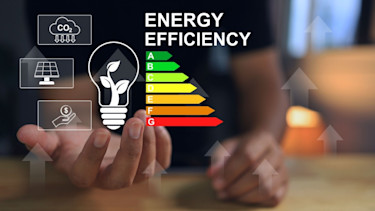Our research
Access all our publications and columns. Use the filters to easily find what content you are looking for.
Filters
All publications
127 results
ESG Economist - Fewer free allowances forces companies towards low-carbon action
- Sustainability
-
The EU ETS free emission allowances offer companies covered by the emissions trading system protection against competition from abroad. The allocation of free emission allowances limits the costs for ETS companies compared to competitors outside the EU. However, because this system also puts a brake on investments in decarbonization, these free emission allowances will be phased out completely by 2034. From that point on, a carbon border adjustment mechanism (CBAM) will take over to partially minimize the loss of competitiveness. This will bring significant changes, particularly for ETS companies in the industrial sector. In this analysis, we highlight the trend in carbon costs for ETS companies in the Netherlands. To this end, we discuss the structure of the EU ETS in the Netherlands, its trends in ETS emissions, and the balance between free emission allowances and ETS emissions by sector. Finally, we highlight the impact of the phasing out of free emission allowances and the trends in carbon costs for ETS companies towards 2030. We end with a conclusion.

ESG Economist - Efficiency progress is a climate game changer
- Macro economy
-
In this analysis, we examine the trend in emission intensity based on greenhouse gases in the EU-27. Emissions intensity indicates the level of greenhouse gas emissions per unit of activity. Energy and emissions intensity are expected to continue to decline, provided that the EU does not relax its climate policy too much.

ESG Economist - Natural gas remains an industrial lifeline
- Natural resources
-
Gas consumption in industry remains high, hindering the acceleration of industrial decarbonisation. Although gas consumption in the EU has declined since 2017, natural gas remains a crucial energy source for energy-intensive industries.

ESG Economist - Carbon prices will reshape steel economics
- Sustainability
-
This analysis is a follow up from our analysis of 22 October 2025 on the most polluting steel processes and the trend in CO2 emissions from these processes. In the underlying analysis, we examine the impact of carbon costs on companies in the sector and through its various methods of steel production. With both analyses, we hope to provide companies in the sector and their suppliers with more insight into identifying potential risks and opportunities.

ESG Economist - Global overcapacity slows down the sustainable steel transition
- Sustainability
-
This is the first analysis in a two-part series on the steel industry. With these reports, we aim to provide insights in potential risks and opportunities for companies in the sector and their suppliers. In this first analysis, we focus on the most polluting steel production processes and trends in their associated CO2 emissions. We compare the CO2 emissions from the two main production routes for steel.

ESG Economist - Strong growth in EU clean tech trade
- Sustainability
-
There is a strong likelihood that global demand for low-carbon technologies (also known as ‘clean tech’) will continue to grow in the coming years. In Europe, growth in demand for clean technologies will be driven mainly by the need to meet climate targets. It is therefore important not only to expand production capacity for clean technologies on the European continent, but above all to ensure that trade flows in clean technologies remain open and accessible. Understanding global trade flows in clean technologies and market developments in this segment is important for both businesses and policymakers involved in the energy transition. It helps to identify potential risks and opportunities. In this publication, we examine the main trends in trade flows of clean technologies in the EU-27. We not only highlight the ratios of imports and exports of clean technologies in the EU-27, but also show which countries are the most important trading partners for the EU-27. We note that there are significant differences between EU Member States in terms of trade in clean technologies and that only a handful of countries make a difference in this regard. Finally, we discuss the growth of trade in clean technologies. The data show that since 2017, trade in clean technologies has grown much more strongly than total trade in goods in the EU-27. We end this note with a conclusion.

ESG Economist - Pressure on energy-intensive industry still high
- Sustainability
-
This publication focuses on three factors that increase production costs: energy prices, environmental taxes on gas and electricity, and the CO2 levy. First, we examine the trend in margins for highly energy-intensive companies and industrial companies that are less energy-intensive. We also look at the impact of fossil energy consumption versus energy prices. Next, we examine environmental taxes – including in an international context – and the impact of the CO2 levy on Dutch industry. Finally, we look at deindustrialisation in the Netherlands and the extent to which this has already become a reality. We also investigate how the government's announced relief measures could affect the sustainability of the sector. We will end this note with a conclusion. (Photo by Mario Caruso on Unsplash)

ESG Economist - Increasing our security could come at an environmental cost
- Macro economy
-
As geopolitical fears mount, EU countries are discussing options to ramp up defence spending. Currently, there are three options: finance it with debt, raise taxes and/or cut spending elsewhere, or use EU programmes.

ESG Economist - Carbon costs for ETS companies are set to rise
- Sustainability
-
In 2024, Dutch companies that fell under the European Emissions Trading System (EU-ETS) have emitted more CO2 than they did a year ago. According to the Dutch Emissions Authority (NEa), the increase was 2.3%, which amounts to approximately 1.4 million tonnes more CO2 emissions. In this short update on emissions among EU ETS companies, we not only look at emissions in the Netherlands, but also compare this with the trends in emissions in the other 26 EU member states. We also highlight the trend in carbon costs. Based on the expected CO2 price and the path of emissions towards 2030, we estimate the carbon costs in the period through to 2030.

ESG Economist - Supply risks of transition commodities mount
- Natural resources
-
So far this year, the price index for transition commodities has risen by 10%, mainly due to the strong recovery of copper prices and some early signs of recovery in Chinese industrial activity.
